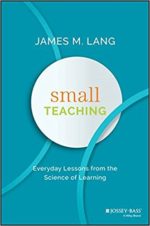On a gray Monday in May 2018, a design team from Notre Dame’s Office of Digital Learning found themselves in Ann Arbor, in a room full of white boards and colored post-its, brainstorming ideas for a collaborative “Teach-Out” with colleagues from the University of Michigan. First developed by the University of Michigan’s Academic Innovation team, Teach-Outs are free and open online learning events intended to activate public engagement around timely social issues.
Speaking on the collaboration, Notre Dame’s Associate Provost and Chief Academic Digital Officer, Prof. Elliott Visconsi stated that, “Like Michigan, the University of Notre Dame is committed deeply to enhancing the common good through educational experiences of all kinds, and committed to cultivating a nuanced, thoughtful civil discourse around issues that matter to us all. So the chance to collaborate on a project of moral urgency was especially compelling to us at Notre Dame”.
A decision was made early on to leverage the affordances of the teach-out model and the resources and expertise of two great American universities in order to raise awareness and generate action to support the 3.5 million American citizens in Puerto Rico who were impacted by Hurricane María.
Led by Notre Dame faculty experts Marisel Moreno, the Rev. John A. O’Brien Associate Professor of Latino/a Literature in the Department of Romance Languages and Literatures, and Thomas F. Anderson, the Dr. William M. Scholl Professor of Latin American Literature and Chair of the Department of Romance Languages and Literatures, the team agreed that for this project to be a meaningful act of social engagement, it needed to begin by listening to the people of Puerto Rico.
Following a series of “design jams,” in June 2018, teams from Notre Dame and the University of Michigan traveled to Puerto Rico to record the personal narratives of people who had been affected by the ongoing crisis. Over the course of 10 days, the teams conducted more than 30 interviews with Puerto Ricans from all walks of life and from all over the island.
These interviews were made available as a “Teach-Out,” a free micro-course delivered on the Coursera MOOC platform that ran between Aug 27 and Sept 24, 2018. The individual testimonials were complemented by resources developed or curated by our faculty designers to deepen learner understanding of an urgent multidimensional crisis that involves policy, culture and history, political economy, environmental loss, civil infrastructure, public health, and human dignity.
A video preview of the course featuring University of Notre Dame President Rev. John I. Jenkins, C.S.C., and University of Michigan President Mark S. Schlissel aired on the video board during the Notre Dame-Michigan game on Sept 1.
By putting the voices of those affected by the crisis in the spotlight and giving them pride of place, the goals of the Listening to Puerto Rico project are to raise awareness of the ongoing and systematic crisis on the island and to promote action in order to help in the island’s recovery.. As Prof. Anderson noted, “Understanding begins with listening. But listening is not just about hearing people’s words: it also implies taking notice of, and acting on, what people say.”
Since the launch of the Teach-Out, both Notre Dame and the University of Michigan have hosted a number of live “teach-ins” featuring Puerto Rican students and faculty to continue the conversation on Puerto Rico. A number of these events were streamed and recorded to enable a global audience to continue to participate in the conversation.
To learn more about the Listening to Puerto Rico initiative and upcoming events, visit listeningtopuertorico.org.

